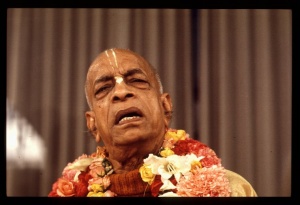SB 4.10.30

A.C. Bhaktivedanta Swami Prabhupada
TEXT 30
- munaya ūcuḥ
- auttānapāda bhagavāṁs tava śārṅgadhanvā
- devaḥ kṣiṇotv avanatārti-haro vipakṣān
- yan-nāmadheyam abhidhāya niśamya cāddhā
- loko 'ñjasā tarati dustaram aṅga mṛtyum
SYNONYMS
munayaḥ ūcuḥ — the sages said; auttānapāda — O son of King Uttānapāda; bhagavān — the Supreme Personality of Godhead; tava — your; śārṅga-dhanvā — one who bears the bow called Śārṅga; devaḥ — the Lord; kṣiṇotu — may He kill; avanata — of the surrendered soul; ārti — the distresses; haraḥ — who removes; vipakṣān — enemies; yat — whose; nāmadheyam — holy name; abhidhāya — uttering; niśamya — hearing; ca — also; addhā — immediately; lokaḥ — persons; añjasā — fully; tarati — overcome; dustaram — insurmountable; aṅga — O Dhruva; mṛtyum — death.
TRANSLATION
All the sages said: Dear Dhruva, O son of King Uttānapāda, may the Supreme Personality of Godhead known as Śārṅgadhanvā, who relieves the distresses of His devotees, kill all your threatening enemies. The holy name of the Lord is as powerful as the Lord Himself. Therefore, simply by chanting and hearing the holy name of the Lord, many men can be fully protected from fierce death without difficulty. Thus a devotee is saved.
PURPORT
The great ṛṣis approached Dhruva Mahārāja at a time when his mind was very perplexed due to the magical feats exhibited by the Yakṣas. A devotee is always protected by the Supreme Personality of Godhead. By His inspiration only, the sages came to encourage Dhruva Mahārāja and assure him that there was no danger because he was a soul fully surrendered to the Supreme Lord. By the grace of the Lord, if a devotee, at the time of death, can simply chant His holy name—Hare Kṛṣṇa, Hare Kṛṣṇa, Kṛṣṇa Kṛṣṇa, Hare Hare/ Hare Rāma, Hare Rāma, Rāma Rāma, Hare Hare—simply by chanting this mahā-'mantra, he immediately surpasses the great ocean of the material sky and enters the spiritual sky. He never has to come back for repetition of birth and death. Simply by chanting the holy name of the Lord, one can surpass the ocean of death, so Dhruva Mahārāja was certainly able to surpass the illusory magical feats of the Yakṣas, which for the time being disturbed his mind.
Thus end the Bhaktivedanta purports of the Fourth Canto, Tenth Chapter, of the Śrīmad-Bhāgavatam, entitled "Dhruva Mahārāja's Fight With the Yakṣas."